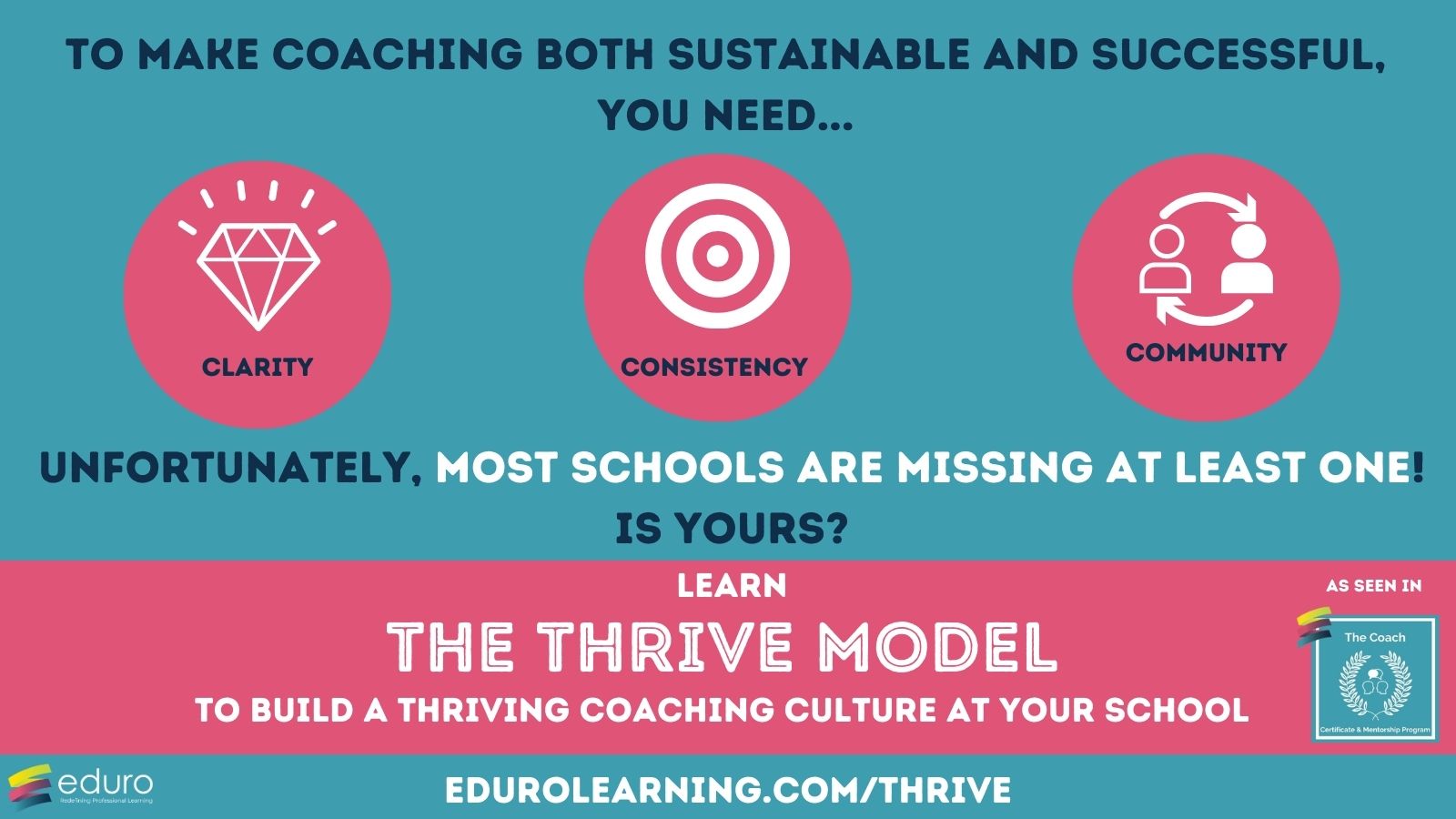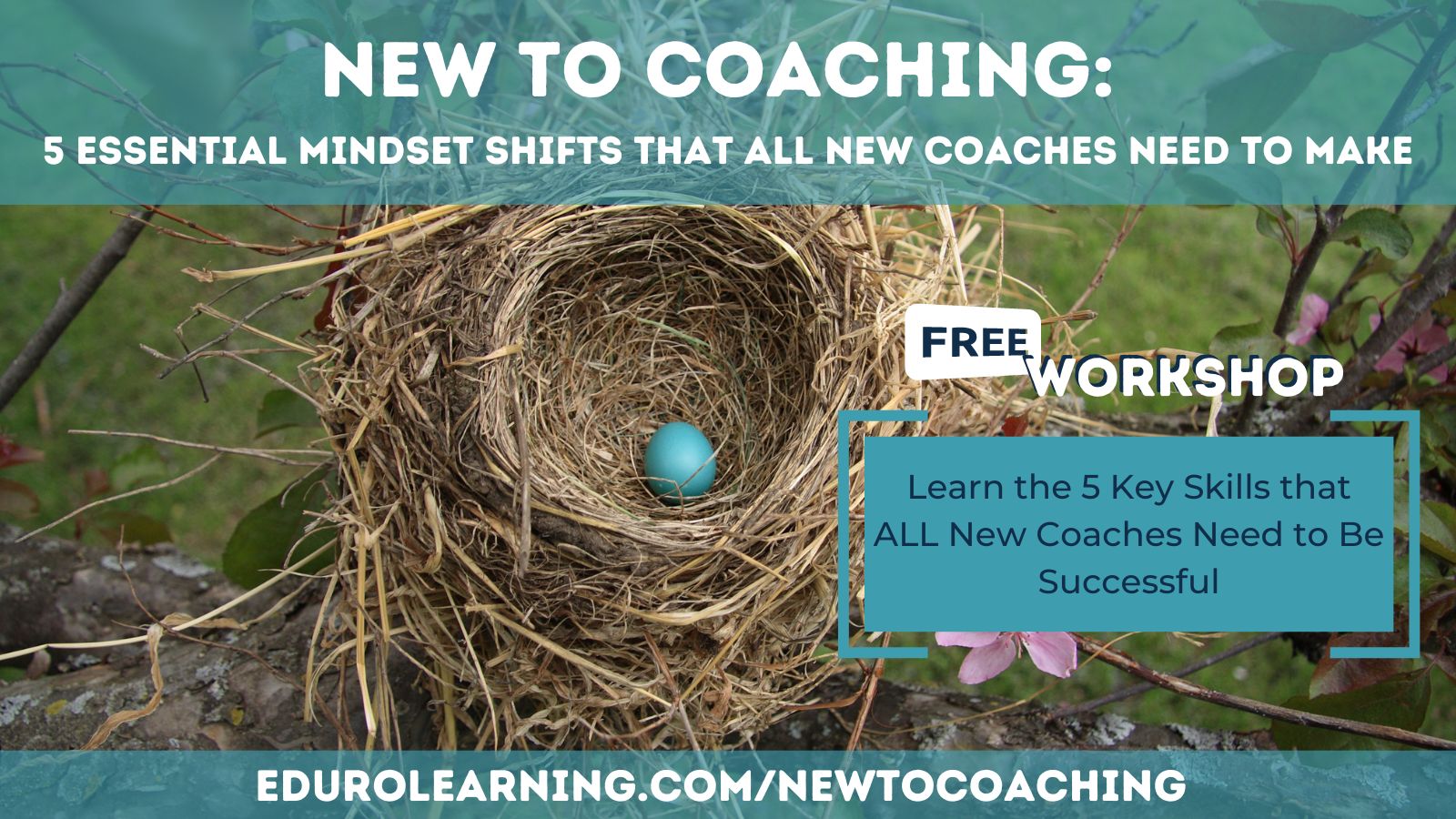In this #coachbetter episode, Kim talks with Ji Han, Associate Director of School Evaluation and Support at the Council of International Schools (CIS) about the power of coaching in schools and why we believe it’s so essential to creating a growth-minded culture. Ji has so much experience as an accreditor, and her own experience as a school administrator that we focus on what makes coaching successful (or not) based on her many school visits. We highlight some of the challenges that international schools face when implementing coaching programs and why defining the role and finding clarity is so essential for coaching to be successful. This episode highlights the importance of the first phase of the Thrive Model: Finding Clarity, and how through that clarity you can build a coaching culture. If you are curious about how to develop a culture of coaching, from the admin perspective, this episode is for you!
Connect with our Featured Guest
Subscribe to #coachbetter via your favorite Podcast Player!
Bonus! Watch the Spotlight Version on YouTube!
SHOW NOTES
You have had so many different experiences as a leader and educator in schools, can you share your journey as an educator with us?
My journey started as a learner, I can still remember my first day of school as an EAL student. I didn’t know English. The teacher gave me a sense of safety and nurturing that I was so happy and impressed with what a teacher does, ever since then I’ve always wanted to be a teacher!
Worked in the US, moved to Europe and International Schools. I had the gift of mentorship, someone saw something in me before I saw it, and insisted that I take a leadership role. Became a team leader and curriculum coordinator. It’s more than just luck, through hard work and consistent learning, I wanted to be a better teacher, a better learner which helps me become a better leader. When you’re in a leadership role, you’re serving the community. Coaching is serving lots of individuals over space and time in different schools.
We are both such passionate advocates for coaching, tell us why you believe in the power of coaching?
I was being coached and coaching way before I even knew it was a concept. I believe it’s a way that people can come to the table of growth and learning as an invitation, rather than a requirement. We all know this idea of self-growth, tied to appraisal, as a must-do. Growth is an invitation. If it’s done well, the person is allowed to think about their own path, owning their learning. The coach walks alongside the person, helping them choose the path. Coaching comes from the coachee.
How can schools tap into the power of coaching? What types of coaching have you seen work? What has been less successful?
The word coaching has had so many definitions because people relate to other types of learning. When the culture is respectful and supportive. It’s all about respecting the people and the relationships and the learning process. When there’s a culture where people feel included, where people feel respected as a learner and a person, and where people feel safe to take risks. A common vision of everyone wanting to support learning, not just learners, but learning.
The community of any school is made up of all learners (students, leaders, teachers, parents). Adult learning impacts the student learning. Adult learning is also good for student learning. It’s all about how we treat people. It’s not about doing something to you, it’s something that we’re coming to with excitement and joy because we want to learn, and when we learn as individuals the whole gets better.
Coaching is a collaborative process where two people are collaborating to learn and the learning is more weighted towards the coaching partner. I strongly believe as a coach you will learn. A collaborative conversation that’s focused on a certain type of experience or learning. The more clear you can be about what you want to focus on, the more effective it can be.
Coaching is not a “fix it” – not a deficit model.
The coaching partner makes the decisions about the what, about the how. In this sense, the coaching partner has the power. That’s where schools and leaders have made coaching too much of a panacea, fix it all. This is such a powerful strategy, but then they take away the self-directed, and autonomous nature of coaching.
Teachers love what they do, and they want to get better. If we start there, every person will have a list. The question is who’s list are we talking about.
What should they avoid? What common problems or obstacles do you see?
We know that all learners are different, which means that they have different needs, it baffles me that we try a one-size-fits-all. It might be practical, but coaching is not one-size-fits-all. People are at different parts of the journey, different phases of learning as learners and as people. It makes sense that when you are using certain strategies to improve, it makes sense that you’re going to have different strategies.
Coaching isn’t the right strategy for everyone all the time.
— one of the issues that comes up all the time, a frustration around coaching is when coaches or school leaders expect coaching to be the solution to every problem. You can’t have a reflective conversation around something you don’t know anything about. Sometimes you need a solution, or it to be modeled. In instructional coaching, we have three stances that we use: consulting, collaborative, and coaching, so you may be using different stances in a variety of settings. But coaching can’t solve every problem. –
The idea that coaching is tied to appraisal. That’s not a good idea. It’s because we’re trying to be efficient. Efficiency helps save time but it doesn’t bring effective results. We need appraisal to ensure that we’re meeting quality standards.
Coaching only works when coaching is not directly tied to appraisal. Coaching and appraisal can be side by side, and enhance each other.
In schools where coaching is tied to appraisal, it’s a sideways step to push teacher improvement onto coaching and away from admin. Coaching only works for some things, we need to be clear in our ultimate purpose. When we have a specific goal
It’s about quality, the quality of learning, for students and teachers.
Coaching can also get into counseling / therapy. People’s trauma and pain can manifest in an inability to work, and schools tend to throw coaching at this issue as well. This is where coaches need to be cognizant of their limitations.
EXPLORE THE THRIVE MODEL
Are you working on building a coaching culture in your school setting?
To make coaching both sustainable and successful, you need clarity, consistency, and community.
Unfortunately, most schools are missing at least one! Is yours?
Use the Thrive Model to find out!
Developed after working with hundreds of coaches and leaders in international schools around the world, the Thrive Model incorporates both the macro view of a coaching program, and the micro view of a coaches practice, to bring together the three essential elements to make coaching both sustainable and successful.
Explore all of our resources about the Thrive Model at edurolearning.com/thrive

SHOW NOTES continued…
You have done (and continue to do) lots of accreditation work, what do you see in schools that have a coaching culture compared to schools that don’t?
Generally in the world of international schools, it is still a fairly new phenomenon. The conversation of coaching has become trendy and now people are trying to get on that bandwagon. If people are talking bout this, it’s something we can leverage as a positive way forward.
My first questions are: what is the purpose, what are the positives, what are the pitfalls? It’s important for the school to define the purpose of what they want to do, and the context they want to use it. It’s really important for schools to have clarity. In schools where I’ve seen coaching be more effective is when there’s more clarity, definition, clear purpose, clear roles and job descriptions. The opposite is when there’s a lack of clarity and you talk to people and everyone has a different definition. The really struggling end is when they talk about using coaching as a “remedy” for teachers who need support in terms of appraisal.
Coaching is nourishing and energizing because I know I’m learning.
How do we get clarity?
Rather than just have the leadership team state it, follow a process. Have a collaborative conversation where that definition is built with community. It takes longer but then we have the right people at the table. Important to include all stakeholders in this conversation, including students.
When you want to know how effective an initiative is, ask students.
When we talk about creating a successful coaching culture in a school setting, what does that look like?
A successful coaching culture is when the people who are being coached are some of the best teachers in the school. That school has made it very clear that coaching is a growth process. So often the superstar teachers are the ones who get the least amount of support. When the strongest teachers are excited and talking about coaching, they become the role models for the fact that we can always be lifelong learners.
A successful coaching culture is when it’s not the leaders who are the coaches. It’s so hard for both admin and teachers to be able to switch between administrator & coach. Not having the admin be the coach and have two hats.
A successful coaching culture is when there’s a lot of sharing going, when the people who are being coached – it’s celebrated and shared, and there’s a safe environment to take risks and share what works and maybe didn’t.
How can we help other school leaders see the value in coaching – not just for themselves (in terms of executive coaching) but in terms of instructional coaching programs in schools?
The people who are making the decisions have a misunderstanding. Those leaders need to be open to understanding that their understanding needs work. Is this leadership willing to engage in a learning journey towards a deep understanding of what coaching is and what our vision and purpose for coaching is in our school, and then have a facilitator lead a discussion. Once the leadership has a level of clarity, they can support the community.
What should school leaders (or coaches) consider when working towards building a coaching culture? What structures can schools put in place to create this kind of environment?
Coaching culture sits within the overall culture. If you’re going to have a coaching culture it’s going to be part of a bigger, wider culture. A school leader needs to be clear about our existing culture and how coaching fits. Looking for: positive, inclusive, safe
Assuming you have a positive open inclusive culture: clarity about the purpose and the how it’s going to happen, and write it down. The second part of clarity is communicating, and writing it down allows you to be more consistent.
A way that we keep ourselves honest and constantly going back and looking at the structure. The structure that worked five years ago, may no longer work today. A commitment from the school that we’re going to review this every two years as part of the strategic plan.
Our biggest ally is being curious about what we want.
Ready to get more clarity around coaching?
If you’re ready to dig deeper into how Clarity, Consistency, and Community can help you impact instructional coaching in your coaching role and your school or organization – or if you’re new to instructional coaching and you’re curious about getting started, join us for one of our courses for coaches!
One of the things we’re most proud of here at Eduro is that there’s no one-size-fits-all learning – you always have choice and voice in how you learn with us. Today’s video highlights one of the key themes that you’ll find in three of our programs, and if you’re curious to take your learning deeper, we have three great options for you.
New Coaches:
If you’re just getting started as a coach, and you want to learn how to make these mindset and skillset shifts, watch our New to Coaching Workshop, which will also tell you all about our brand new course, Getting Started as a Coach.

Experienced Coaches:
If you’re already a coach & you want to think about being more intentional & strategic in your practice, watch our workshop on the Thrive Model for Coaching Success which will help you evaluate your program to see where you may have room to grow – and help you decide if our year-long mentorship and certification program, The Coach, is right for you, right now

Just like all our learning experiences, the content in both of these courses is self paced so you get access to everything immediately – but you get so much more: when you join the course, you get access to our #coachbetter global community with optional group coaching calls at various time zones to meet & connect with other coaches PLUS private office hours with me to get all your questions answered & work through anything coaching related in your unique school context.
Wherever you are in your coaching journey, we can support you!
For All Coaches
Connect with us!
- Subscribe to the podcast iTunes | Spotify | Stitcher
- Follow us on social media: Twitter | Instagram | LinkedIn
- Join our #coachbetter Facebook group
- Explore our courses for coaches
![The Importance of Defining the Purpose of Coaching with Ji Han [Ep 220]](https://res.cloudinary.com/edurolearning/image/upload/v1692248873/coachbetter%20Podcast/Ji_Han_pyinyo.jpg)




Recent Comments